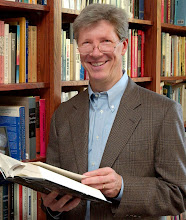I
have tried to point out that sexuality, while enormously important, and at the
core of what it means to be holy, is not at the center of our theology. Our cardinal beliefs, which pertain to
salvation, are about God, not us – and our sexuality is always a bit broken,
fallen, bedeviled by subterranean forces we hardly understand. I would exit the denomination if it declared
Jesus was just a man, or we are saved by works.
But not over a single practice among hundreds.
Most importantly, I’ve explained how
splitting up would be the worst conceivable witness to the unchurched, and to
our cynical world. If we can’t do any
better than the division and rancor in our country right now, we prove we have
nothing to offer.
Now, during this hazy time when the
Bishops’ Commission has been named, and when all we can do is pray for them,
and for ourselves – and as many of us feel gloomier than ever, fearing or even
expecting a split, I keep drifting in my mind to utterly practical questions. Like, if there is the dreaded split right
down the middle: What will I be doing for a living and where? Where will my pastor friends wind up? What signage will need changing? What won’t get paid for any longer? And in a way, the most pressing question of
all: What will become of the church
where I am serving?
Suppose we get the divorce. One denomination becomes two, a conservative,
brooking no deviation from straight or celibate sexuality, and a progressive,
allowing and even affirming same gender marriage and LGBTQ ordinations. What then?
The General Conference sends a memo to me and our board chair, giving us
ninety days or six months to select which way we go?
Our case is pretty interesting, indicative
of why there will be more carnage than we anticipate, utterly harrowing and
heartbreaking to me and the people I love.
Just the property: our trustees hold, in trust for the conference,
massive neo-gothic structures sitting on prime real estate in Charlotte. Both of the new judicatories would covet the
property, and the apportionment income.
Our contributions are a significant percentage of our conference’s
income now. But that amount will shrink
drastically for whoever winds up with our facility.
Because internally we would be forced to
make a choice we do not wish or need to make.
We have engaged in the arduous labor our denomination as a whole has
never engaged in: a prayerful, thoughtful, respectful conversation on the
theology and practice of sexuality. With
broad and strongly felt disagreement on the matter, we have chosen to stay
together, to love, and by our very unity to be a witness to the world.
And yet we would be compelled to make a
choice. How would that happen? Is it simply an item on the agenda of the
next Administrative Board meeting, and majority wins? Do we take a congregational vote, with each
member getting to cast a ballot? Would
there be campaigning within? Or even from outside groups lobbying to win Myers
Park?
I’ve tried to guesstimate what the tally
here would be. We have 5,200
members. We treat the children like
members, and also the super active adults, especially young adults, who’ve
never actually joined. But let’s leave
them out for now. Of the 5,200 official
members, I’d guess 1,600 wouldn’t pay attention or open their mail. Of the 3,600 left, I’d imagine 1,400 would rally
to the progressive side, and about 1,000 would go conservative. Or maybe it would be roughly a tie. Or maybe 1,400 to 1,000 the other way. What would happen to the "losers"? Of course, the remaining 1,200 would be too disgusted to
vote at all. Our young adults would, quite simply, be done with us.
Many – several dozen, I'd estimate – would exit
and become Southern Baptist, or Episcopalians.
I’d suspect that many more, though, in the hundreds, would just give up on church
altogether, if the one they loved and trusted couldn’t do any better than this
sorry state of affairs. And I would not
blame one of them. We’d suddenly have
more Sunday School classes, since they’d have to split too. Families would be divided over which way to
go. A 5,200 member church gutted, with
maybe 1,500 left.
We would quickly have to lay off two
thirds of our staff, and hack our mission spending down to a small fraction of
what it’s been. Within months, a clinic
in Haiti would shut down, families moving out of homelessness would head back
to the streets. We’d be the
laughingstock of Charlotte. The new
conference of the new denomination wouldn’t even be all that glad to have us,
as we’d have so little money left to send in.
Then where would the clergy we’d have to
let go wind up? Not only would the
financial decimation reduce the number of pastoral jobs out there. We would also have a rash of mismatched
clergy and congregations. If
congregations get to choose which denomination to go with, I’d imagine the
clergy would get to pick too. At least
in my part of the world, and I suspect all across the United States, on average
the clergy are far more progressive than their congregations. In Western North Carolina, for instance, out
of 1,000 clergy I’d estimate at least 500 would choose the new progressive
institution; but no more than a few dozen churches would do the same. Where would the clergy work? And who would pastor the conservative
churches?
I’m not a pessimist by nature. But I do sense there is considerable naivete
about how neatly a split might proceed.
I know those who think that basically the Southeast and the Midwest would
overwhelmingly go conservative, and the West and Northeast would go liberal, or
there might be a semblance of an urban/rural split, like the one we see now in
presidential elections.
But
it’s way more complicated state by state, and even church by church. The unforeseen ripple effects of a forced
division, even in a single parish like mine, would be catastrophic. A split in United Methodism, beyond the
heartache, the lost relationships, and the embarrassment of theological
surrender, would create a black hole of practical disaster. We would be the butt of church humor for the
next generation. And whatever shared
mission work we cherish would evaporate.
Purists will say you should do the right
thing, no matter what the consequences are.
But within our denomination, aren’t we picking one right thing, which
isn’t really the main thing, and then by picking that one right thing to be
right about, we render ourselves incapable of doing all the other right things
that really are the main thing?





















